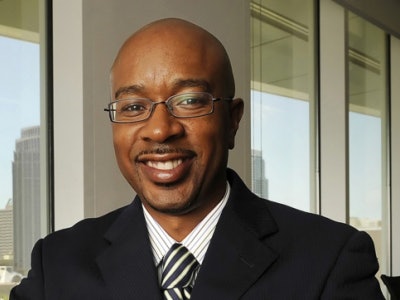SAN JUAN, P.R. — The issues and challenges that impact urban education aren’t particular to the United States, says Dr. Chance W. Lewis, the Carol Grotnes Belk Distinguished Professor of Urban Education at the University of North Carolina at Charlotte.
 Dr. Chance W. Lewis
Dr. Chance W. LewisAt the three-day international conference that has brought more than 400 scholars and practitioners to this island from corners around the globe, Lewis is cautioning participants to not merely dwell on the problems that beset urban schools, but to focus instead on finding creative solutions and outcomes for the future.
“One thing I learned from going to conferences is that we are trained to ask questions about the problems and not to talk about solutions,” says Lewis, who has organized the bi-annual International Conference on Urban Education, bringing together a diverse group of educators, faith-based leaders and community-based activists from across the world to strategize around how best to educate young people.
Although “urban” education is often seen as a code word for African American, Lewis says that when one examines large metropolitan spaces around the globe — whether it be in Washington, D.C., London or San Juan — striking similarities quickly emerge.
This week participants will find the “space that allows them the freedom to really dive into the issues, particularly around students of color,” says Lewis, who is also the director of the Urban Education Collaborative at UNC-Charlotte. The Collaborative raised funds to bring 14 boxes of school supplies and books to three different schools across the island.
Six countries, 43 states and 175 universities are represented at the gathering, where a range of topics from school discipline to the experiences of Black males is being discussed. Undergraduate and high school students are also presenting their research.
The genesis for the conference came to Lewis about seven years ago after he realized that the plight of students — particularly students of color in urban areas — was not the source of serious inquiry at other conferences that he had attended.
“There was an unmet need,” he says. “And if you can’t find it, create it.”
And the synergy was on full display. For example, a preacher whose congregation is interested in starting a faith-based charter school was picking the brain of a university researcher who had ideas of how the school might be structured.
“You don’t get that mix at many other conferences,” says Lewis, who presented the Outstanding Urban Teacher Award to Princess Fils-Aime, a kindergarten teacher at Spark Academy in Newark, N.J and the Outstanding Urban Principal Award to Alicia Hash, a principal at the Cotswold Elementary School in Charlotte, N.C.
Dr. Sonia Nieto, a prominent educator who spent 26 years as a professor at the University of Massachusetts, Amherst before retiring in 2006, delivered a rousing speech titled “From Brooklyn Dreams to the Academy and Beyond.”
Nieto, whose parents grew up in Puerto Rico but later relocated to Brooklyn, grew up in a working class family and quickly came to realize that, “zip codes matter and they matter a great deal.”
From an early age, she aspired to become a school teacher, instructing Puerto Rican students at The Bilingual School in the Bronx in the 1960s. It was during her years as a school teacher that she honed her passion for teaching, eventually earning a doctorate in education and going on to publish books and mentor a new generation of educators for nearly three decades.
The success of who succeeds and who does not is as much about “luck and opportunity as intelligence and merit,” she says, adding that when critics of public schools—particularly those located in poor minority neighborhoods—argue that the families of these students don’t value education, Nieto believes that it’s the responsibility of educators and people of good will to forcefully push back.
“If you hear people say that, please stop them in a loving way,” she says, noting that poverty, racism and other causes has contributed to the nation’s growing achievement gap. “That public education hasn’t worked for everyone is an indictment of the system.”
Jamal Eric Watson can be reached at [email protected]. You can follow him on Twitter @jamalericwatson


















